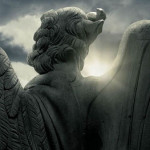We run our website the way we wished the whole internet worked: we provide high quality original content with no ads. We are funded solely by your direct support. Please consider supporting this project.

Angels and Spirits in a Secular World
This week, we’ve been thinking about why we should believe in a spiritual realm in a world shaped by secular thought. One argument that supports the belief that spirits are real is the oldest, most venerable, and most popular argument for this belief in the western intellectual tradition. In essence the argument runs as follows: Throughout all of nature we observe a continuum of life forms leading up to humans. There seem to be no major gaps in the gradation of levels of power, intelligence and personality between us and the lowest form of inorganic life. Now if this much is true of life forms leading up to humans, the argument goes, why think it is not true of life forms leading up from humans? Why think the continuum stops with us?
According to this argument, it is irrational, counter-intuitive, and anthropocentric to suppose that the continuum does stop with us. We should rather suppose that “above us” there is a continuum of life forms leading up to the One who is life itself. In traditional Christian thought this realm between us and God was conceived of as the domain of angels. It has been suggested that the preoccupation with the possibility of extra-terrestrial life forms in our own day is simply a secularized technological version of this same ancient intuition and process of reasoning.
It is difficult to dismiss this line of argumentation as outmoded, for a good deal of science is predicated on precisely the kind of logic this argument employs. As Benedict Ashley notes.
[O]ne of the modes of creative thinking that has paid off richly in science…is extrapolation or pattern thinking. For example, Mendelejeff’s periodic table was based on symmetrical arrangement of known elements according to their properties, but it contained blanks. Eventually it was possible to fill in these blanks by the discovery of new elements. Again, the table of possible kinds of crystalline structures was first worked out mathematically from known types and the blanks were eventually all filled by new discoveries. Our evolutionary view of the world presents us with a great variety of kinds of primary units from atoms to the most complex of living forms. We are always looking for “missing links” to complete this pattern….
He then goes on to apply it to the argument at hand.
Therefore, when we discover that in our visible universe there is a type of organism, the human species, which introduces a wholly new principle of behavior, namely abstract, symbolically expressed, creative thought, we naturally conjecture that the very limited exemplification of this type of life found only in the single human species cannot be the only one. If we also accept that the world has been created by a God who is an infinite intelligence, we are even more struck by the immense gap that lies between these two extremes of mental power, the human and the divine … (Theologies of the Body, ch.13)
On this basis it can be argued that the supposition that there exists spiritual intelligences and powers that fill in the “gap” between us humans and the supreme intelligence and power is a rational supposition.
Some will of course respond to this argument by insisting that the continuum of life forms leading up to us is simply the result of chance evolution. There are no major “gaps” between us and life forms below us because we evolved step by step from them. And since we humans happen to be the most highly evolved form of the life on this planet it is unwarranted to try to postulate any continuum above us on this basis. In other words, while chance got us humans here by means of the ladder of evolution, there’s no reason to suppose that it leads anywhere beyond us.
Three things may be said. First, it must be conceded that this argument loses most of its force if one does not believe in a supreme intelligence, and thus does not see an immense gap between us and God. The reasonableness of this argument admittedly depends a good deal on the reasonableness of believing in God. And so, this argument will naturally have a greater appeal to a theist than to a non-theist. Secondly, the view that evolution has proceeded by means of purely natural chance processes has thus far proven difficult, if not impossible, to demonstrate scientifically. The objection has no more force than does the purely naturalistic theory of evolution—which, to many of us, is close to zero. Third, even if one does hold that we evolved by chance, Ashely’s argument that it is reasonable to assume that we are not the only instance or kind of being in the cosmos that is like us yet stands. One would still be justified in attempting to extrapolate from human characteristics to look for other human-like forms of life, physical (as with extra-terrestrials) and otherwise (as with angels).
Photo credit: Simeon Muller via Unsplash
Category: General
Tags: Angels, Demons, Spiritual Warfare
Topics: Spiritual Warfare, Cosmic Conflict
Related Reading

4 Reasons to Believe in a Spiritual Realm
For the last century, a large number of theologians and church leaders have claimed that the biblical view of spiritual warfare—where there is an actual realm where angels and demons exist—is no longer believable. The influential German scholar, Rudolf Bultmann famously wrote, “It is impossible to use electric light and the wireless and to avail…

Old Testament Support for the Warfare Worldview
Rebuking Hostile Waters Satan plays a minor role in the Old Testament relative to the New Testament. Instead, the warfare worldview in the Old Testament is expressed in terms of God’s conflict with hostile waters, cosmic monsters, and other gods.Like their Ancient Near Eastern neighbors, ancient Jews believed that the earth was founded upon and…

Did Jesus Say That God Causes Blindness?
As he went along, he saw a man blind from birth. His disciples asked him, “Rabbi, who sinned, this man or his parents, that he was born blind?” “Neither this man nor his parents sinned,” said Jesus, “but this happened so that the works of God might be displayed in him (Jn 9:1-3, NIV) Commentators typically appeal to this passage…

What To Do with the Bible’s Talk of Satan
Recently, Roger Olson raised the question on his blog about why Satan is ignored in modern theology. He observed how Greg’s theology takes an “obvious, ‘up front,’ blatant belief in a very personal, very real, very active Satan who has great power in the world.” Because we often have so little to say about Satan…

6 Things the Church Fathers Can Teach Us about Spiritual Warfare
Image by Christina Saint Marche via Flickr Unlike our thinking today about the source of good and evil in the world, the early church fathers, including Irenaus, Athenagorus, Origen, and others before Augustine, possessed a warfare worldview. Here are 6 ideas that are common in their writings: The Reality of the “World-in-Between” The church fathers assumed…

Do Angels and Demons Really Exist?
While the supremacy of God is never qualified in the Bible, this supremacy is not strictly autocratic. Other “gods” or spiritual entities like angels and demons are not mere puppets of the God of the Bible. Rather, they appear to be personal beings who not only take orders but also are invited to give input…
